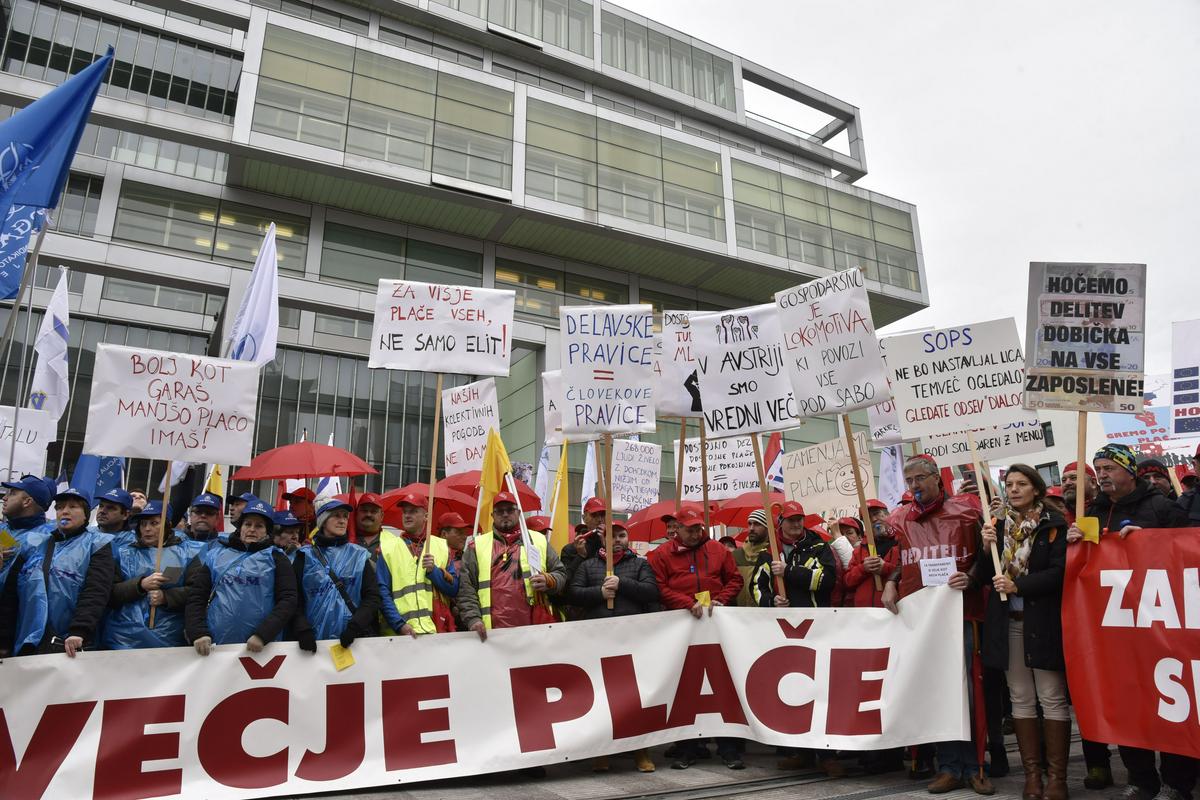
The protest had been announced by the Association of Free Trade Unions of Slovenia (ZSSS) and by the Pergam Conference, and was joined by KS90, Alternativa, and Neodvisnost. It was held primarily in response to threats made by the employers’ associations about the voiding of collective bargaining agreements if any changes are made to the legislation setting the minimum wage. The proposed changes would increase the minimum wage by 30 euros and would exclude all bonuses. The Slovenian Employers’ Association opposed the changes because of the lack of social dialog.
But the unions have stated that the social dialog with the employers had collapsed much earlier. They added that the wage-setting provisions of collective bargaining agreements in many industries contain pay levels far below the minimum wage. In his speech, Jakob Počivavšek of Pergam, stated that despite talking about economic growth and prosperity, “the employers say that they will go out of business because of a 30-euro increase in the minimum wage.” Počivavšek added that the employers are not sharing the results of economic growth with their employees, and that many people have alerted the employers to this problem, “but that they are obviously deaf, so we are making noise today.”
Representatives of the Mladi Plus trade union took part in the protest out of solidarity. They pointed out that solidarity is a key element of union work and that fair pay for fair work is a key demand for all generations. According to Adin Crnkić, “We young people are hardest hit because of precarity. But fair wages are our common goal.” Marko Funkl from the Union of Precarious Workers voiced similar sentiments: “Precarity reduces the value of labor, so the fight for higher wages is also a fight for precarious workers.” Andraž Mali of the VIR labor union, added that there has been “enough deference when it comes to social dialog that keeps all workers down. Employees of the public and the private sector will support each other.”
Representatives and MPs from the political party Levica (The Left) also took part in the protest. The party had called for a similar raise in the minimum wage. Levica’s MP Miha Kordiš said that he was there to support the unions in their call for higher wages. “The employers are making their profits on the backs of the workers, so it’s only fair that the profits are fairly divided.”
Some of the protesters expressed the opinion that this time, the protest is being held at the right location. Goran Lukić from the Workers’ Counseling Office stated: “We came to show the ‘rich poor’ to the ‘rich rich’ crowd.” The dead of ZSSS Lidija Jerkič added that we have seen enough “humanitarian campaigns for the children of workers and the low retirement-age pensions.” She went on to sttae that the workers are only demanding respect. After the protest, Jerkič and Počivavšek met with representatives of the Slovenian Chamber of Commerce (GZS).
After meeting with the representatives of the unions, GZS head Boštjan Gorjup said that the Chamber of Commerce is in favor of a medium-term social agreement that would set future wages. When asked about the protesters’ claims that they have enough of “empty” promises concerning social dialog, he said that the dialog within the framework of the Economic-Social Council (ESS) has brought positive results, since the wages have changed along with the value-added index, but he admitted that “we have sadly fallen asleep behind the wheel regarding industry-specific collective bargaining agreements.”

































































